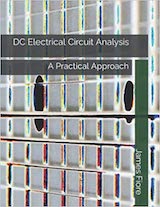
|
FreeComputerBooks.com
Links to Free Computer, Mathematics, Technical Books all over the World
|
|
- Title: DC Electrical Circuit Analysis: A Practical Approach
- Author(s) James M. Fiore
- Publisher: Mohawk Valley Community College (2020); eBook (Creative Commons Licensed)
- License(s): CC BY 4.0
- Paperback: 374 pages
- eBook: HTML and PDF
- Language: English
- ISBN-10/ASIN: 1654515477
- ISBN-13: 978-1654515478
- Share This:

|
A practical and thorough treatment of DC circuit analysis, this text begins with coverage of scientific and engineering notation along with the metric system. Also included is a discussion of the scientific method – the basis of our modern system of investigation and technology. From there, basic concepts and quantities are introduced such as charge, current, energy, power and voltage. Subsequent chapters introduce resistance, series circuits, parallel circuits and series-parallel circuits.
The text continues with chapters covering analysis techniques such as superposition, source conversions, mesh analysis, nodal analysis, Thévenin's and Norton's theorems, and delta-wye conversions; plus dependent sources, and an introduction to capacitors and inductors. RL and RC circuits are included for DC initial and steady state response along with transient response. The text also features over 500 end-of-chapter problems. A companion text covering AC circuit analysis picks up where this one leaves off.
About the Authors- James Fiore is a professor of Electrical Engineering Technology at Mohawk Valley Community College in Utica, NY. He has over 35 years of teaching and course development experience in ABET accredited electrical engineering technology programs.
- Electronic Engineering
- Microcontrollers, PLC, VLSI, etc.
- Embedded Systems
- Electrical and Computer Engineering

- DC Electrical Circuit Analysis: A Practical Approach (James M. Fiore)
- The Mirror Site (1) - HTML and PDF
- The Mirror Site (2) - PDF (with Laboratory Manual)
-
 Lessons in Electric Circuits (Tony R. Kuphaldt)
Lessons in Electric Circuits (Tony R. Kuphaldt)
A 6 volumes series of textbooks on the subjects of electricity and electronics. This book was written to be a good enough book without delving too heavy on the math, while still maintaining a lot of important information.
-
 AC Electrical Circuit Analysis: A Practical Approach (James Fiore)
AC Electrical Circuit Analysis: A Practical Approach (James Fiore)
Cover topics including series, parallel, and series-parallel RLC circuits. Numerous theorems and analysis techniques are examined including superposition, Thévenin's theorem, nodal and mesh analysis, maximum power transfer and more.
-
 Circuit Theory (WikiBooks)
Circuit Theory (WikiBooks)
The aim of this book is to assist students in understanding the basic concepts of circuit theory and developing the fundamental tools of linear circuit analysis, which will be useful for all engineers.
-
 AC Circuits (Chad Davis)
AC Circuits (Chad Davis)
This book covers Alternating Current (AC) circuit theory as well us a brief introduction of electronics. It covers the basic theory of AC signals, sinusoidal waveforms, square waves, triangle waves, the mathematics background, resistors, inductors, and capacitors.
-
 DC Circuits (Chad Davis)
DC Circuits (Chad Davis)
This book covers Direct Current (DC) circuit theory: The basics for circuits that include DC sources (voltage or current) and resistors; Problem solving techniques for circuits that include only DC sources and resistors; Capacitors and inductors.
-
 Understanding Electronics Components (Filipovic D. Miomir)
Understanding Electronics Components (Filipovic D. Miomir)
This book is meant for those people who want to create electronic devices with their own hands. All components are illustrated and the circuit-symbol is explained in detail. Both simple and complex examples are provided for the beginners.
-
 An Introduction to Electronics (WikiBooks)
An Introduction to Electronics (WikiBooks)
The aim of this book is to explain the design and function of electronic circuits and components. It covers electronic circuit components, DC analysis, and AC analysis, and provides readers with a broad overview of both the linear and digital fields of electronics.
-
 Mastering STM32 (Carmine Noviello)
Mastering STM32 (Carmine Noviello)
This book introduces the reader to this exciting MCU portfolio from ST Microelectronics and its official CubeHAL, showing its functionalities with a lot of examples and tutorials, assumes that you are totally new to this family of MCUs.
-
 Compact Models for Integrated Circuit Design
Compact Models for Integrated Circuit Design
This book provides a modern treatise on compact models for circuit computer-aided design (CAD), offers a balanced presentation of compact modeling crucial for addressing current modeling challenges and understanding new models for emerging devices.
-
 Network-on-Chip: The Next Generation of System-on-Chip
Network-on-Chip: The Next Generation of System-on-Chip
This book provides a basic overview of topics associated with NoC-based design: communication infrastructure design, communication methodology, evaluation framework, and mapping of applications onto NoC.
-
 Flexible Circuit Technology (Joseph Fjelstad)
Flexible Circuit Technology (Joseph Fjelstad)
This book was written to provide a bridge of understanding by offering a clearly defined set of steps which take the reader from basic concepts of flexible circuits to a more detailed review of the various technology and materials.
-
 Designing Analog Chips (Hans Camenzind)
Designing Analog Chips (Hans Camenzind)
A comprehensive introduction to CMOS and bipolar analog IC design. The book presumes no prior knowledge of linear design, making it comprehensible to engineers with a non-analog background.
-
 Operational Amplifiers and Linear Integrated Circuits
Operational Amplifiers and Linear Integrated Circuits
This book offers an extensive and detailed exploration of the modern op amp and associated specialized linear integrated circuits. The exploration begins with a fundamental building building block, the differential amplifier.
-
 A Pragmatic Introduction to the Art of Electrical Engineering
A Pragmatic Introduction to the Art of Electrical Engineering
This book provides a solid overview of the electrical engineering discipline that is especially geared toward the many non-electrical engineering students. It uses of practical applications to illustrate important principles.
-
 Circuit Theory (WikiBooks)
Circuit Theory (WikiBooks)
The aim of this book is to assist students in understanding the basic concepts of circuit theory and developing the fundamental tools of linear circuit analysis, which will be useful for all engineers.





